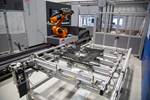Swinburne-CSIRO Testlab grows composites competency via industrial-scale 3D printing
Industry 4.0 facility is integrating an additive manufacturing approach to its holistic processes to optimize composite component production rates, quality and cost.
Share
Read Next
Source | Swinburne University of Technology
’s (Melbourne, Australia) Swinburne-CSIRO National Industry 4.0 Testlab, which provides fully digitally supported engineering and manufacturing solutions for parts, processes and entire systems, has recently highlighted its “world-first” fully automated, industrial-scale production facility using a 3D printing approach to carbon fiber composite component creation.
Based at Australian Government agency CSIRO’s Clayton facility, the Swinburne-CSIRO National Industry 4.0 Testlab supports innovative research and development for Swinburne’s Aerostructures Innovation Research (AIR) Hub, Victorian Hydrogen Hub, ARC Research Hub for Future Digital Manufacturing and collaborations with CSIRO's Data61 arm.
The Global Innovation Linkages program project is another key initiative of the facility. Developing a highly automated, flexible approach to the manufacturing process, the project integrates 3D printing technology with a distinctive composite curing process and digitization technologies. Swinburne notes that this will achieve a leap forward in increasing the production rates and quality of composites part manufacture, while reducing production costs.
“Testlab is already supporting groundbreaking projects in areas like aerospace, automotive, 3D printing and digital twinning,” says Industry 4.0 Testlab research director professor Boris Eisenbart. “This is only the start for this facility, and I am excited for what we can do next to continue to build our partnership with CSIRO and our industry network.”
The facility is anticipated to give the ability to generate, translate and accelerate research, training and technology into opportunities and a competitive advantage for Australia.
Related Content
-
Otto Aviation launches Phantom 3500 business jet with all-composite airframe from Leonardo
Promising 60% less fuel burn and 90% less emissions using SAF, the super-laminar flow design with windowless fuselage will be built using RTM in Florida facility with certification slated for 2030.
-
Carbon fiber, bionic design achieve peak performance in race-ready production vehicle
Porsche worked with Action Composites to design and manufacture an innovative carbon fiber safety cage option to lightweight one of its series race vehicles, built in a one-shot compression molding process.
-
A new era for ceramic matrix composites
CMC is expanding, with new fiber production in Europe, faster processes and higher temperature materials enabling applications for industry, hypersonics and New Space.






